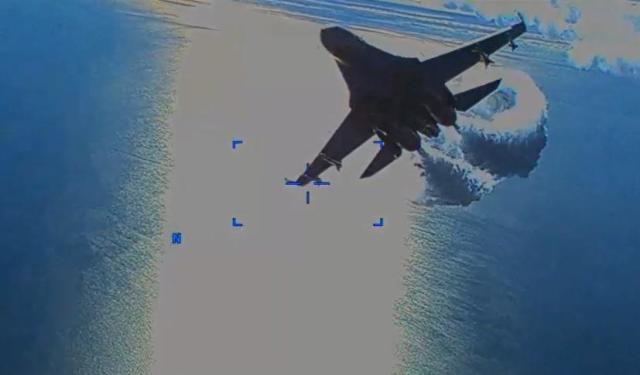U.S. military officials said on March 15 that the intercept of a U.S. spy drone over the Black Sea by Russian fighter jets was intentional and part of a pattern of “aggressive and unsafe” actions by Russian pilots in international airspace as Washington and Moscow ratcheted up their rhetoric over the incident.
U.S. Defense Secretary Lloyd Austin spoke by phone to his Russian counterpart, Sergei Shoigu, for the first time in five months, both sides said, but neither gave details of the conversation. The Russian Defense Ministry said the request for the call came from the United States.
“It’s important that great powers be models of transparency and communication,” Austin told reporters in Washington. He said keeping the lines of communication open would help “prevent miscalculation going forward.”
U.S. Army General Mark Milley, the chairman of the Joint Chiefs of Staff, who appeared at the briefing with Austin, said that, while the intercept was intentional, it is still unclear whether the jet’s collision with the MQ-9 Reaper drone was.
Austin and Milley spoke after a virtual meeting of the so-called Ramstein group of dozens of countries that have been providing arms to Kyiv.
Austin declined to characterize the drone incident as an act of war but stressed that the United States will continue to fly and operate wherever international law allows.
The Russian Defense Ministry said in its statement on the call with Austin that Shoigu said the United States had provoked the incident by ignoring flight restrictions the Kremlin has imposed over the Black Sea due to what it calls its “special military operation” in Ukraine.
The ministry also blamed “the intensification of intelligence activities against the interests of the Russian Federation.” Such U.S. actions “are fraught with escalation of the situation in the Black Sea area,” the ministry said, warning that Russia “will respond in kind to all provocations.”
Officials in Moscow and Washington earlier accused each other in the crash of the drone on March 14 near the Crimean Peninsula, which Moscow illegally annexed from Ukraine in 2014.
Washington said Russia committed “a brazen violation of International law” caused by “unsafe and unprofessional” behavior after Russian fighter jets dumped fuel on the MQ-9 drone on March 14 in an apparent attempt to blind or damage it.
The United States said one of two Russian Su-27 jets flew close to the drone and that one of them hit its propeller. Moscow denied the accusations and said no contact was made and blamed “sharp maneuvering” by the U.S. aircraft for the crash.
“The Americans keep saying they’re not taking part in military operations. This is the latest confirmation that they are directly participating in these activities — in the war,” Kremlin Security Council Secretary Nikolai Patrushev said earlier.
The drone has yet to be recovered, and White House National Security spokesman John Kirby said it may never be because the location where it fell into the Black Sea is very deep.
Milley said it would be several days until the United States knows the size of the debris field in waters as deep as 1,500 meters.
“It probably sank to some significant depths, so any recovery operation from a technical standpoint would be very difficult,” Milley told reporters.
Russia said it would try to retrieve the remains of the drone, but Patrushev acknowledged the difficulty.
“I don’t know whether we will be able to retrieve it or not, but it has to be done. And we’ll certainly work on it. I hope, of course, successfully,” Patrushev told the Rossiya-1 TV channel.
Kirby could not confirm a report on CNN that the Russians have reached the site but said whatever is left of the drone will not provide much intelligence.
The United States “is not overly concerned about anything [the Russians] might glean off of it,” he said on CNN.
